With the recent unrest developing on DePaul University’s Lincoln Park campus, some faculty members are standing up for students taking part in the encampment. Other faculty are showing support for Pro-Israel students.
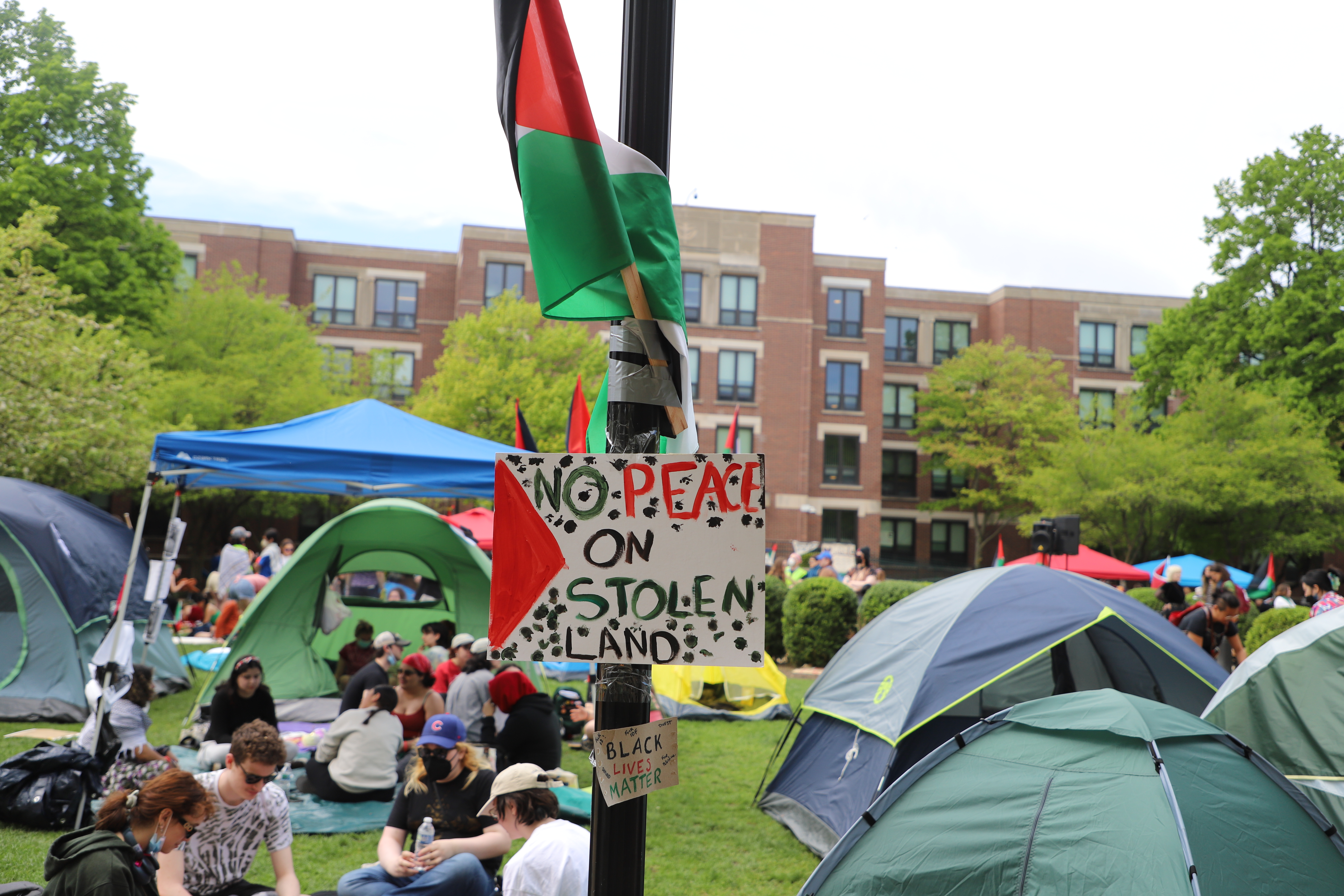
DePaul student protesters camp out in the quad in support for Palestinian liberation on Wednesday, May 1, 2024. Photo by Gia Clarke.
As the DePaul encampment continues, DePaul faculty members share their thoughts and perspectives about the ongoing protest.
In response to the lack of U.S. support for the Palestinians in the Israel-Palestine conflict, college students across the country have taken a physical stand against the U.S. government’s actions and in favor of their schools’ providing more financial transparency and divesting from businesses that support the Israeli military. Many supporters of Palestine have set up encampments on their school campuses and have been camping out for days.
Hamas, which controls Gaza, attacked Israel on Oct. 7, killing an estimated 1,200 Israelis and taking around 240 people hostage. The Israeli military has since conducted more than six months of military action in Gaza, including large-scale airstrikes and raids. More than 34,500 people have been killed in Gaza, including more than 13,000 children, according to Palestinian health officials. The United Nations says “hundreds of thousands” more could die if Israel goes forward with a planned invasion of the city of Rafah.
DePaul’s encampment started last Tuesday, April 30. According to a joint Instagram post by SJP DePaul, AMP Chicago and the DPU Divest Coalition, the encampment protesters’ demands include labeling the Israel-Palestine conflict a genocide, joining the city of Chicago in calling for a ceasefire, establishing an ethical advisory team on investment responsibility, creating an Arab/Swana student center and providing amnesty to protesters.
Faculty support for DePaul’s encampment
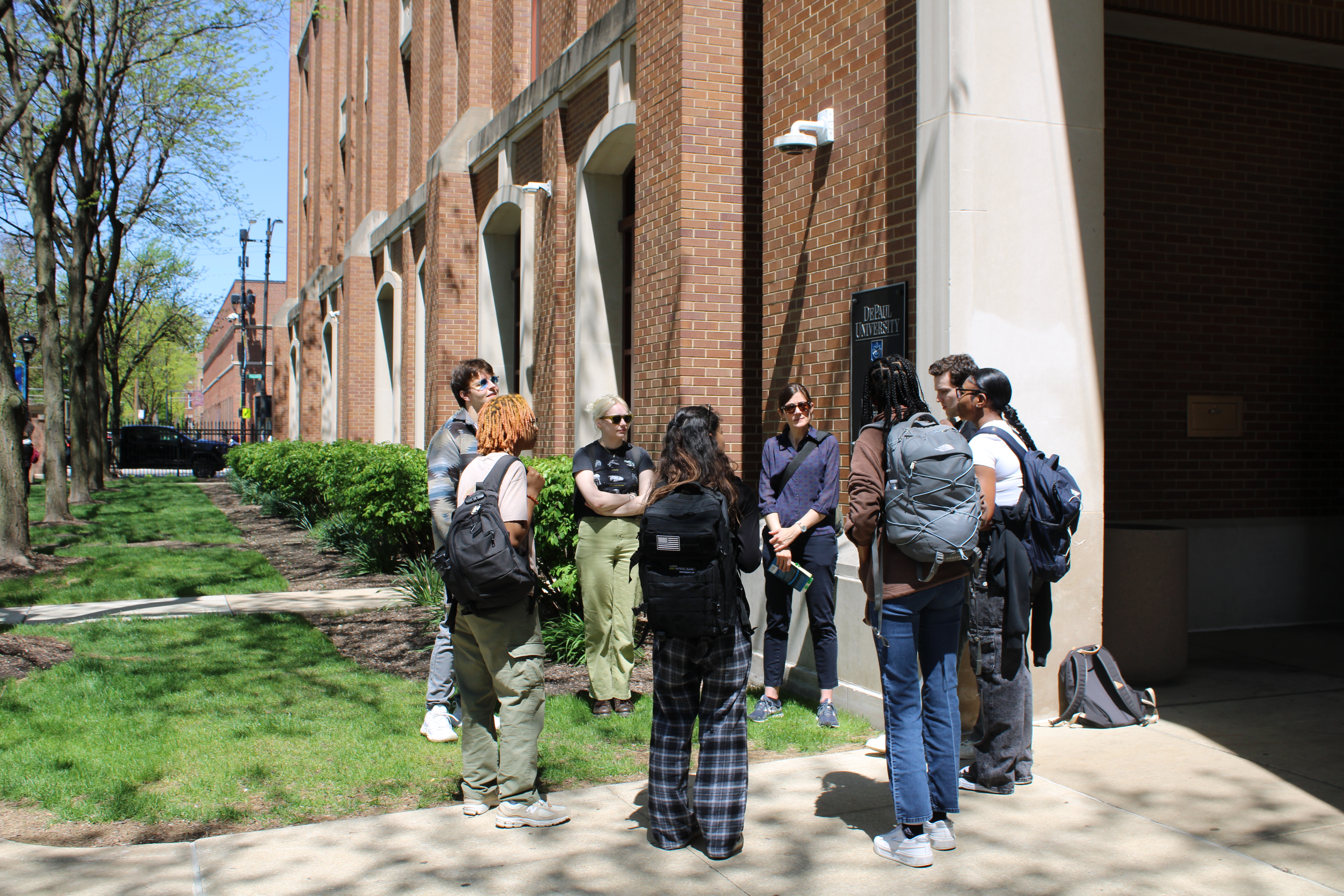
English professor Marcy Dinius teaches her class outside of the DePaul Richardson Library on April 30, 2024. Photo by Elizabeth Gregerson.
Various DePaul faculty, who are speaking as independent faculty and not for the organizers of the protest, are in support of DePaul students taking a stand.
“It’s long overdue, but I’m so glad that students took this initiative,” said Kaveh Ehsani, an associate professor of international studies.
Ehsani, art history Associate Professor Lisa Mahoney and English Professor Marcy Dinius were seen wearing buttons that read, “I work for the students not the endowment.”
To Ehsani, wearing the button symbolized that DePaul’s priorities are more about fundraising for the endowment than about the education of the students, and he said the buttons were “evergreen,” as they were reused from a previous protest he participated in.
“If you’re prioritizing endowment, you’re completely sacrificing the quality of education,” Ehsani said.
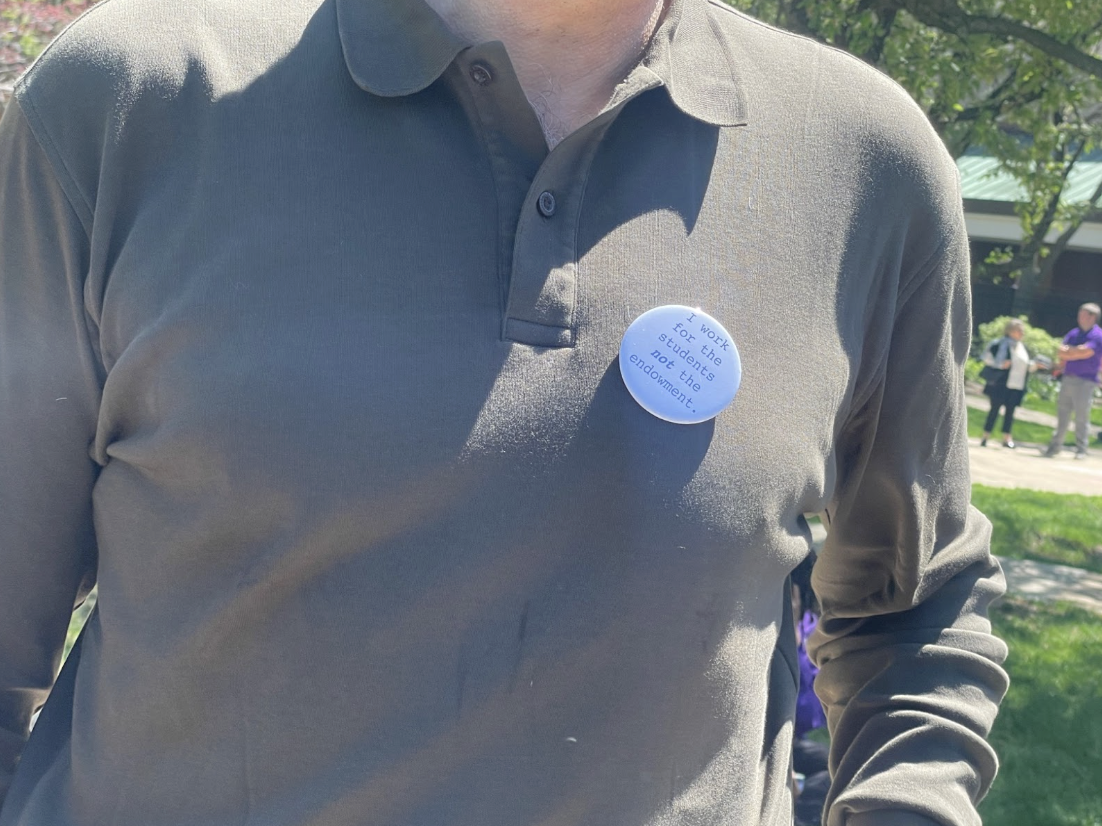
A faculty member at DePaul University poses on April 30, 2024 with a pin from a previous protest a few years back. The pins read, “I work for the students not the endowment.” Photo by Gia Clarke.
Dinius agreed with Ehsani, stressing that “students have a right to know how their very valuable tuition dollars are being spent.” To Dinius, transparency between the students and the university is important because students spend tens of thousands of dollars to attend DePaul, and they deserve to know where the money is going.
“They’re going into a lifetime of student debt to support things that they have a right to know about,” Dinius said.
Dinius said she is also disappointed with the way schools across the country are handling the protests. She said it’s unfortunate universities care more about the endowment and appeasing credit bureaus because those bureaus “include campus security and stability in all of their credit ratings for universities and not only expect, but demand that universities bring the campuses under control, otherwise they will financially punish for them for this.”
Moody’s 2021 Higher Education Methodology states, “The investments in a college or university’s endowment could be affected by physical risks and by other sources of environmental risks, especially if those investments are concentrated and illiquid.”
Because safety and physical risk bring down investments, Dinius believes that universities prioritize the endowment rather than fostering independent thinkers.
“This is the backbone of how universities run on, this very financialized way, and I’m out here as part of a group that wants to change that. That’s not right, that’s not education,” Dinius said.
In a response to protesters published Monday, DePaul President Robert L. Manuel said the university board of trustees is open to establishing an ethics advisory committee for its endowment whose members would include faculty, staff and students.
“It is important to note that we are establishing this advisory committee because we believe it is a thoughtful measure, consistent with shared governance,” the response said. “Further, though our endowment investment practices do not drive direct investments currently, the intent of this advisory committee is not to divest from Israel.”
The response from President Manuel also said DePaul asks the independent fund managers of its endowment to sign the voluntary Principles for Responsible Investment established by the United Nations.
In terms of the encampment, Mahoney said she was delighted that students are educating themselves about conflicts going on in other parts of the world. She was pleased that students are not only educating themselves, but taking a stand in what they believe is right.
“It’s a generation of people that are now educating themselves about these injustices,” Mahoney said. “All my life, nobody has. Most of the people that were around me would not have known much about what was going on in Israel and Palestine, and now that’s changing.”
Ehsani also is in support of Gen Z with the way students are being critical about issues around the world and responding to them in ways where there is physical risk.
“It’s so brilliantly encouraging to see your generation being so critical, and not accept and swallow whole propaganda that we’re hearing, it’s remarkable,” Ehsani said.
Dinius and Ehsani thought it was especially powerful to see in-person demonstrations, especially after the COVID-19 pandemic. Ehsani said social media “is great, but not a substitute for politics.”
“You have to put your skin on the line and say, ‘Alright, I’m here, that’s what I’m saying.’ There’s a give and take that doesn’t exist on social media. So, this is wonderful at DePaul,” Ehsani said.
Dinius acknowledges the real risk that students face by physically protesting for days on campus grounds: “We’re seeing students at other universities suspended, expelled, their financial aid cut, not being allowed to live in their dorms anymore, facing homelessness,” she said.
Dinius said the “brass knuckle responses” from schools are exploiting vulnerabilities that students have, and she does not believe these approaches are okay.
“That’s completely unacceptable to me as a faculty member. It’s not at all why I got into this profession. And I’m glad students find that unacceptable, too,” Dinius said.
According to Dinius, some faculty sent an open letter to President Manuel and Provost Salma Ghanem on April 29. This first letter urged the DePaul administration to keep students safe, as they are vulnerable, despite political pressure:
“As a community characterized by Vincentian values, DePaul has the responsibility to adopt an approach to conflict resolution that cares for the sanctity of human life, despite political pressure to comply with existing policy choices of governments and politicians.”
This open letter currently has 133 signatures from DePaul faculty and staff as of May 4, according to an Instagram post by the DePaul Faculty for Justice in Palestine (@facultyforpalestinedpu).
View this post on Instagram
After no response from the first letter, according to the DePaul Faculty for Justice in Palestine’s Instagram, faculty sent a follow up letter on May 3 calling for an immediate meeting with President Manuel, Provost Ghanem and Executive Vice President Sherri Sidler to “address and respond to the Divestment Coalition’s demands about disclosure and investment.”
The faculty’s list of demands in the letter include setting up a meeting with the administration and the DePaul Divestment Coalition about disclosure and investment. The letter also said DePaul should not call the police and inflict violence on their students, should provide amnesty for all student protesters and faculty/staff, and should immediately cease all university communications that suggest the encampment is making DePaul a dangerous environment.
“All students are asking for is the right to protest, and they’re bringing out, at some schools, the National Guard and snipers and rubber bullets,” Dinius said. “It’s Congress saying, ‘Universities, you need to stop these students. You need to shut them down.’ And that’s an affront against freedom of expression and inquiry that’s extremely fascist.”
In response to demands for amnesty, President Manuel offered this reply in his statement:
“At this point, we will not offer blanket amnesty for everyone involved in the encampment, counter protesting, or other support of the events on our quad.
“Depending on the engagement towards a resolution for all parties — protesters and counter protesters alike — in the ultimate resolution of the encampment, we may consider how amnesty could be delivered for certain violations that have occurred.
“It is important to note that we cannot provide amnesty for charges originating from places other than the university (e.g. violations of civic ordinances or criminal offenses).
“We do stand ready to talk with the DePaul student protesters about specifics as they relate to ending the encampment on the Lincoln Park quad.”
Faculty members in solidarity with Jewish students on DePaul’s campus

The Chicago Jewish Alliance held a rally at DePaul’s School of Music on May 5, 2024, where some faculty members were in attendance. Photo by Alexandra Murphy.
On Sunday morning at 10:30 a.m., day six of the encampment, the Chicago Jewish Alliance held a rally at the Chicago School of Music in support of Israel.
In attendance, there were faculty members and students along with other outside counter-protesters.
Before the rally started, DePaul faculty members also expressed concerns about Jewish students reporting incidents of harassment and abuse with the recent unrest.
Steve Resnicoff, a professor who teaches in the College of Law and is director of its Center for Jewish Law and Judaic Studies, said he showed up for the rally on Sunday to show Jewish students on campus that they are not alone.
“My understanding of the rally is just to show support for the Jewish students, and so that they shouldn’t feel alone and shouldn’t feel so vulnerable,” said Resnicoff.
Resnicoff expressed that the support for Jewish students is imperative being a minority of the student body.
“They’re treated as a minority in terms of being helped and protected,” he said.
Another professor, Craig Klugman, who teaches bioethics and health humanities, said he was at the rally to show support for Jewish students, saying there are some students who are being ridiculed on DePaul’s campus and who have faced harsh circumstances since the encampment began.
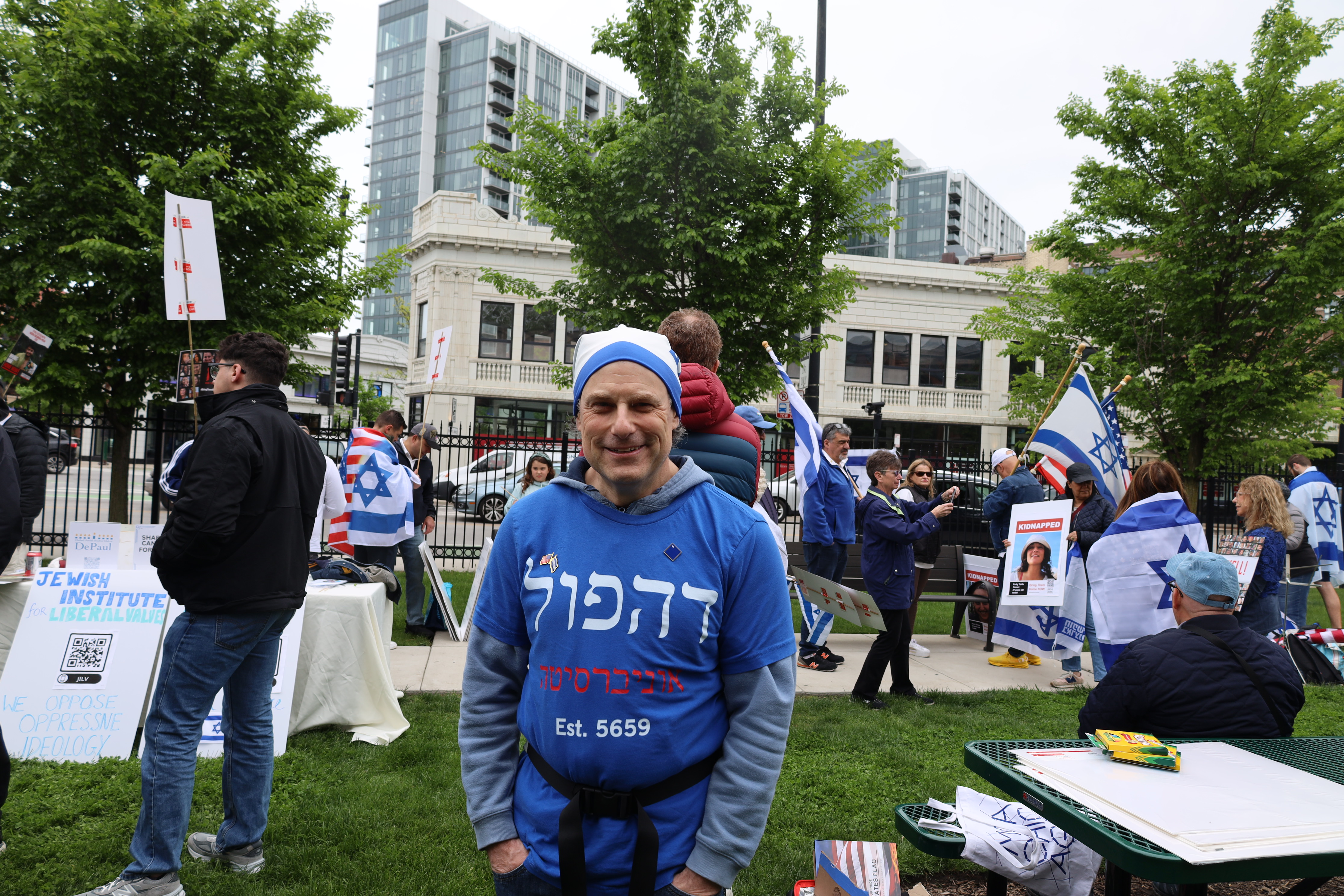
Professor of Bioethics & Health Humanities Craig Klugman attends the Chicago Jewish Alliance rally on May 5, 2024. Photo by Alexandra Murphy.
“There has not been a word of grace toward the Jewish students who are hurting at this time,” said Klugman. “So, I’m here to support the students and to keep them safe. That’s my number one priority.”
Klugman went on to explain that in light of everything, the Jewish community has come closer together. Not only Jewish faculty, he acknowledged, but outside community members and allies who have reached out in support.
“I think that the academy represents a very small number of people on campus and the vast majority seem to care and seem to want similar things that we all want,” he said. “You know, what we have in common is our strength.”
Shortly after the rally started Sunday, the Chicago Police Department showed up on Fullerton outside of the Lincoln Park campus Quad. It was not clear whether the members of the rally at DePaul’s School of Music were part of the counter-protester crowd standing on Fullerton Avenue.
Pro-Palestinian protesters from the encampment and counter-protesters chanted and yelled back and forth until counter-protesters crossed the street to move away from the Quad around 1 p.m., and the crowd diffused. There were also some fights that broke out between the two groups.
At the end of the day after the rally, the office of DePaul President Manuel said in an email that the university worked with the counter-protest organizers to “identify a dedicated space to maintain distance away from ongoing protests in the encampment on the Quad.”
The email went on to say that the university communicated with members of the encampment and the counter-protesters about its expectations for the protests and that despite these guidelines, both groups ultimately encountered one another and escalation occurred.
The DePaul administration has written a response to each one of the DePaul Divestment Coalition’s demands. President Manuel requested to meet with the encampment organizers on Tuesday. The encampment continues.
CORRECTION: On May 9, 2024, 14 East issued a correction in the first paragraph describing faculty who supported the counter-protest as solely in support of Jewish students, instead of in support of Israel. We understand that the wording may have implied that the DePaul encampment does not include members of the school’s Jewish student body. This is false. Jewish students have been among the participants and organizers.
Header photo by Jana Simovic


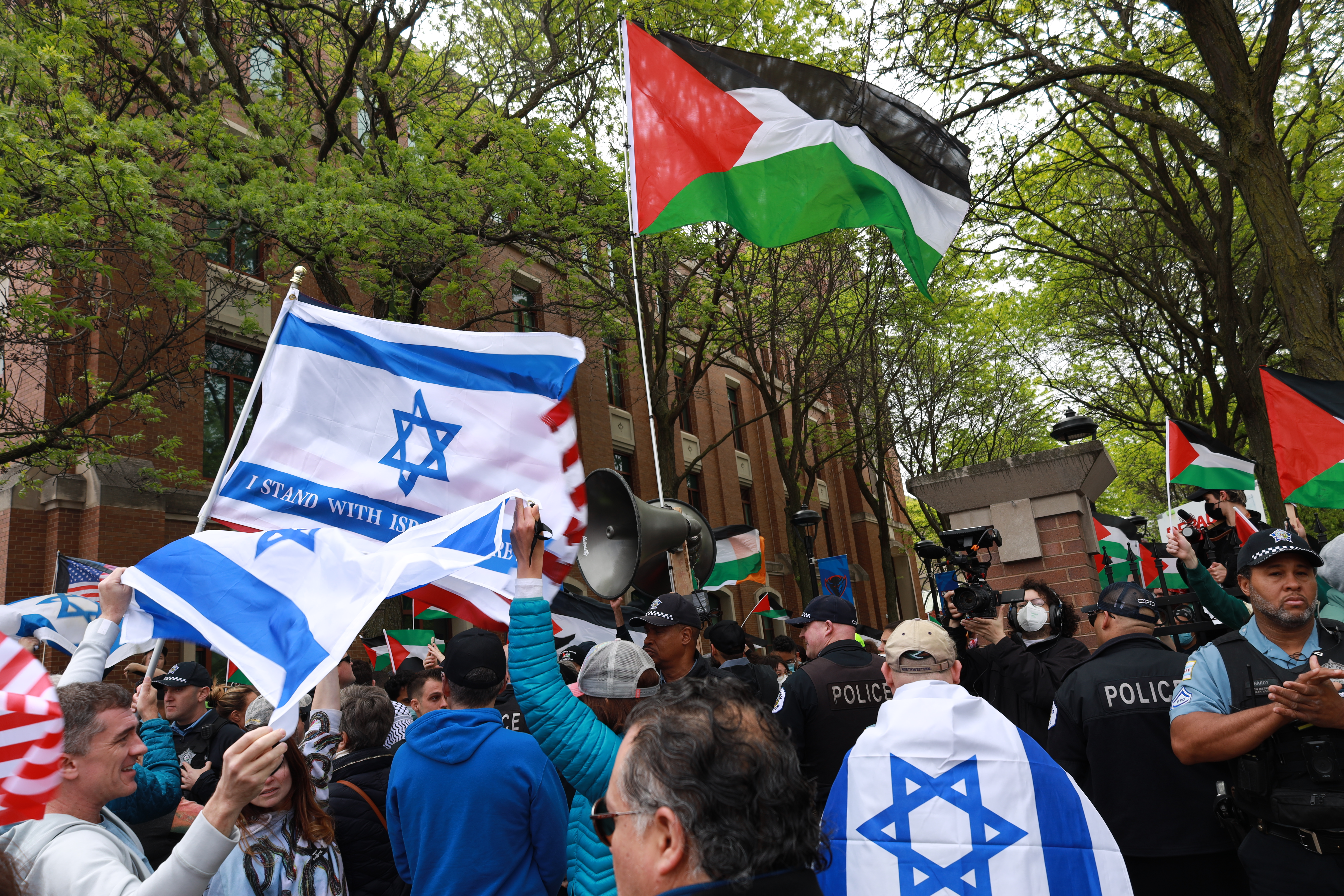

NO COMMENT